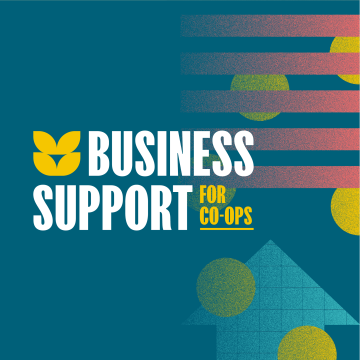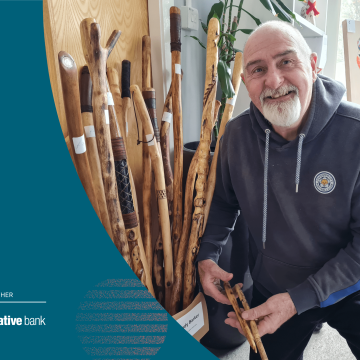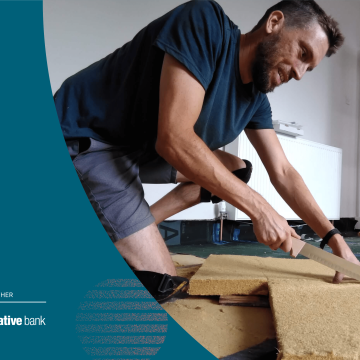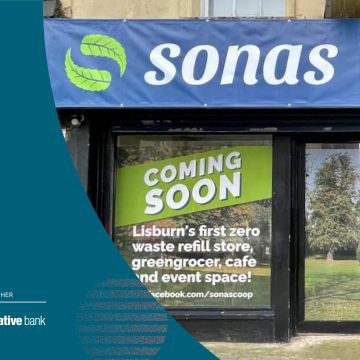Two Queens: Forging a sustainable, co-operative future for artists
Case study

Meet the makers who’ve formed a community benefit society to realise their ambitious plans and keep a creative community thriving…
Home to painters, sculptors, weavers, printers, ceramicists and more, Two Queens is an artist run gallery and studio in the heart of Leicester’s Cultural Quarter.
It was established in 2011 by graduates from De Montfort and Loughborough Universities – and has been programming regular exhibitions and events since March 2012.
Two Queens was set up as a company that leases the building and rents out studio space to artists. “It naturally started out as a co-operatively managed venture,” said Co-Director Dan Kelly. “Over time, it came down to a few core artists running the business.
“We currently have 43 studio holders and another 100 members of our artist associate scheme. We still very much like to get them involved in the business and invite them to our AGM.”

When considering Two Queen’s future, the team decided that converting to a community benefit society (CBS) would be the best option. Dan explained why:
“Our current leasehold has a couple of years left on it, so we have the ambition of launching a community share offer so we can secure the building in the long term and continue to make it an affordable resource for artists in the community.
“It’s also important that our customer members – the studio holders and associate artists – have a say in how it is run. Our customers are more to us than that. We see and work alongside them every day.”
To help them convert to a CBS, the Two Queens team received help from the Business Support for Co-ops programme, delivered by Co-operatives UK and supported by The Co-operative Bank.
The support came in the form of expert advice and mentoring from Ian Wilson of co-op development agency CASE, aided by Deana Bamford from Coalville CAN, a nearby community benefit society supporting creatives and makers.
“They are the local experts and it was good to get to know them,” said Dan. “They gave us some really useful advice on different co-operative structures and financial projections – and have both been really helpful.
“They helped us understand community share offers, social investment and certain rules that we didn’t know existed. They had a deeper level of knowledge of co-operatives that was really useful to learn.
“The main thing we worked on was a 30-year cash flow forecast to prove the business case in the long term. Coalville CAN had created a great spreadsheet template that
enabled us to produce a big 30-year projection.
“That’s been good – becoming a co-op and entering a community of people who want to help and support each other. It’s an invaluable experience.”
Dan and his colleagues also used the services of the Co-operatives UK’s Advice Team and were particularly impressed by Co-operative Governance Support Advisor Dane Pollard.
“You get a sense there’s no one-size-fits-all with co-ops. There’s a lot of fine tuning of details, so they’re not just ‘off the shelf.’ But Dane has great knowledge and can explain the intricacies really well.

“Getting this support from Co-operatives UK started us on the journey to seriously coming up with solutions for our future,” Dan continued. “We’d been thinking and talking about these things for a while – and this set us down a path.
“We’ve gone from feeling like we didn’t know what we were going to do once the lease ended – to now having a solid plan. Business Support for Co-ops helped us lay the foundations for that.”
Having become a CBS in March 2023, the Two Queens team are now planning the next steps for their business – and their community share offer.
“Part of what people know Two Queens for is the gallery and exhibition space. We also want to mobilise that community of interest, as well as the community we serve, and bring those people on side to become investor members.
“We’ll be applying to the Community Shares Unit Booster Fund for support,” said Dan. “Raising capital via a share offer will hopefully secure the longer-term future of the organisation and the building – and enable artists to have affordable space indefinitely.”
Find out more

Business Support for Co‑ops

Business Support – start your co-op

Business Support – convert to a co-op

Business support – help for your co-op

Free business banking with The Co‑operative Bank

Coalville CAN: A co‑operative, constructive and creative community

Ham Wharf Mooring Co-op: A fairer deal for a boating community

Loco Home Retrofit: Saving the planet, one household at a time


